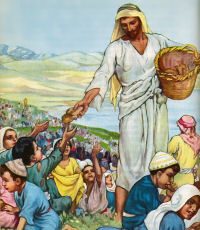» Enjoy our Liturgical Seasons series of e-books!
"The kingdom of heaven is like a treasure buried in a field, which a person finds and hides again, and out of joy goes and sells all that he has and buys that field. Again, the kingdom of heaven is like a merchant searching for fine pearls. When he finds a pearl of great price, he goes and sells all that he has and buys it" (Matt 13:44-46).
The feast of St. Peter Chrysologus, which is ordinarily celebrated today, is superseded by the Sunday liturgy.
Click here for commentary on the readings in the Extraordinary Form of the Roman Rite.
Sunday Readings
The first reading is taken from the first Book of Kings 3:5, 7-12. God gives Solomon a choice of gifts. Solomon asks God for "an understanding mind," so that he could always do what was just and best for his subjects. God rewards him with the gift of wisdom making him the wisest man that ever lived. — The Sunday Readings by Fr. Kevin O'Sullivan, O.F.M.
The second reading is from the Letter of St. Paul to the Romans 8:28-30. The theme of this reading concerns the graciousness and mercy of God at work in calling men to himself, justifying them, and glorifying them as well. The point of the reading is the eternal mystery of the ineffable love of God for man, even before man existed. — A Celebrants Guide to the New Sacramentary - A Cycle by Kevin W. Irwin
The Gospel is from St. Matthew 13:44-52. The lesson of these two parables is as true for us today, as it was for those Palestinians to whom Christ spoke. All Christians are called on to imitate the two wise men, and surrender all their earthly possessions if necessary in order to gain eternal life. Does this "giving all" mean that we are all expected to abandon the world and take on the religious vows of poverty, chastity and obedience? There are many who do just this. But it is not the only way, nor the normal way, to purchase the eternal treasure. Heaven is within the reach of all, who follow the ordinary vocations of life and partake of this world's joys and pleasures within the framework of God's commandments, but never lose sight of the goal toward which they are moving.
Keeping within the framework of God's commandments is the difficulty. We need not have a vow of obedience, but we must obey all legitimate authority. We may possess the goods of this world, but only such goods as we lawfully and justly acquire. Nor may we withhold all of these from a fellow man who is in need. We do not have to take a vow of chastity, but yet we must be chaste, we must use the gifts and the pleasure of sex only within the limits set down by God's wise laws.
All of this is not easy for human nature. But we are not relying on weak human nature, we have within our reach in the Church all the spiritual and supernatural aids we need. Our twentieth century, it is true, is so engrossed in chasing after the earthly comforts and pleasures of the body, and so devoid of any spiritual or other-worldly outlook, that even those who know and believe that there is an eternity after death, find it hard to allow their faith and convictions to govern and direct their daily actions. Yet, the evil example of others will never justify our wrong-doing. The commandments of God are still binding, even though they are openly and flagrantly violated by individuals and whole nations today.
Remember this: we shall not be asked at the judgment, "What did your neighbor do?", but "what did you do?" If we lose the pearl of great price in the eternity of happiness God has offered to us-it will not be the fault of others. The fault will be ours and ours only. We refused to pay the price. We did not think it worth the "paltry all" which we possessed in this life.
Excerpted from The Sunday Readings by Fr. Kevin O'Sullivan, O.F.M.
 Commentary on the Readings for the Eighth Sunday after Pentecost
Commentary on the Readings for the Eighth Sunday after Pentecost
"There was a certain rich man who had a steward,. . .reported. . .as squandering his counting of thy stewardship,. . .thou canst be steward no longer'" (Gospel)
As children we have access to our Father's "possessions" (Gospel). "By virtue" of our Baptism, "we (all) cry, . . .Father! unto our God (Epistle).
In the business of salvation the Father has appointed us as "stewards" over human goods and Divine graces, to use, not to abuse them. The Introit recalls that even though we now receive "mercy," yet one day we must stand before "Justice."
The meaning of this Gospel story is: "Act prudently," you children of God; use material treasures so as to make eternal friends; exercise your talents in the spiritual and corporal works of mercy. Those whom you help to save, will help save you.
Excerpted from My Sunday Missal, Confraternity of the Precious Blood







